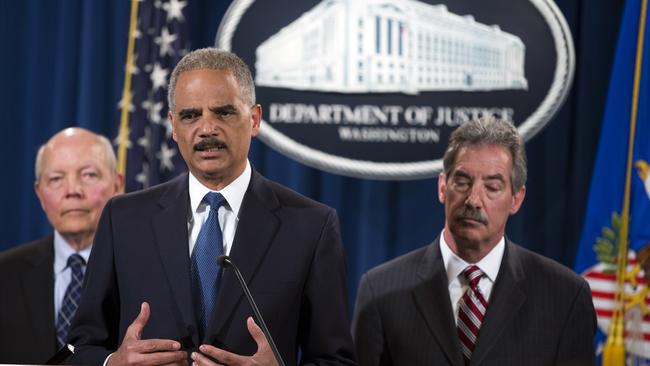Credit Suisse to pay $2.8bn to settle US tax evasion case
CREDIT Suisse has become the first financial institution in more than a decade to plead guilty to a crime.

Credit Suisse has become the first financial institution in more than a decade to plead guilty to a crime as it admitted it conspired to aid tax evasion and agreed to pay $US2.6 billion ($2.8bn) to settle a probe by the US Justice Department.
US Attorney-General Eric Holder, in announcing the charges yesterday, said the bank engaged in an “extensive and wide-ranging” scheme to help wealthy Americans hide assets.
The criminal charge filed in federal court outlined a decades-long, concerted attempt by Credit Suisse to “knowingly and wilfully” help thousands of US clients open accounts and conceal their “assets and income from the IRS”.
Mr Holder said the bank destroyed account records sent to the US for client review, concealed transactions and “failed to take even the most basic steps to ensure compliance with tax laws”. Even after a US crackdown on Swiss accounts in 2008 led Credit Suisse and rival UBS to tighten restrictions on the kinds of services they would provide to American customers, they continued to take steps that hindered investigators.
Credit Suisse did not conduct a thorough inventory of the accounts its managers oversaw, and some managers helped clients move their assets to other offshore banks so they would remain hidden to the US, according to the filing.
When it became clear in 2010 that the US Justice Department was investigating the bank’s conduct, Mr Holder said Credit Suisse “failed to retain key documents, allowed evidence to be lost or destroyed, and conducted an inadequate internal inquiry”.
“This conspiracy spanned decades,” Mr Holder said.
“Credit Suisse not only knew about this illegal, cross-border banking activity, they wilfully aided and abetted it. Hundreds of Credit Suisse employees, including at the manager level, conspired to help tax cheats dodge US taxes.”
Prosecutors have charged eight former Credit Suisse employees with helping aid tax evasion.
In a statement, Credit Suisse chief executive Brady Dougan said “we deeply regret the past misconduct that led to this settlement”.
The bank said the penalties would slash its profit in the current quarter by $US1.8bn but that it expected no “material impact” on operations from the settlement. The bank said it would reduce assets and sell real estate to rebuild its capital ratio, a key measure of the bank’s ability to absorb losses. Credit Suisse’s capital buffer is closely monitored by Switzerland’s financial regulator, Finma.
The terms of the settlement include a $US100 million payment to the Federal Reserve, more than $US715mto the New York Department of Financial Services, and about $US1.8bn to the Justice Department. Credit Suisse already has set aside more than $US800m to deal with the issue.
While Credit Suisse is not turning over names of account holders as part of the agreement, it is handing over information that Deputy Attorney General James Cole said would lead to specific account holders.
“There’s going to be a substantial amount of information that we’re going to get that will enable us to find out who the account holders are and take the appropriate action,” Mr Cole said.
The settlement marks the Justice Department’s biggest victory in its crackdown on tax evasion since UBS agreed to pay $US780m as part of a deferred prosecution agreement in 2009. As part of that deal, UBS acknowledged aiding tax evasion but didn’t plead guilty.
Still, some said the department didn’t go far enough.
US senator Carl Levin said it was “a mystery to me why the US government didn’t require as part of the agreement that the bank cough up some of the names of the US clients with secret Swiss bank accounts”.
Prosecutors took steps to limit the potential ripple effects from a guilty plea by winning assurances from regulators not to take punitive measures that would cripple the bank, such as stripping Credit Suisse of its ability to operate in the US.
The bank’s chief executive and chairman are not expected to lose their jobs over the case, despite calls by some in Switzerland for them to leave.
In extracting a guilty plea, prosecutors are gambling that the criminal charge won’t harm the bank in unexpected ways.
Prosecutors have won admissions of guilt before, sometimes with catastrophic outcomes.
Junk-bond powerhouse Drexel Burnham Lambert ultimately collapsed after pleading guilty to six counts of fraud in 1989 and accounting giant Arthur Andersen was felled by a criminal indictment.
As Credit Suisse’s problems first arose, executives generally expected a settlement was possible for less than $US500m, according to an insider — a sum that reflected the size of the bank’s business with undeclared American assets compared with UBS’s.
UBS was charged with helping Americans hide about $US20bn in assets from tax authorities.
Still, Credit Suisse’s relationships with its clients and partners may take a hit.
Many pension and mutual funds have guidelines that prevent them from dealing with institutions that have pleaded guilty to criminal charges. Other clients may simply choose to steer clear of a bank perceived to have trouble, experts say.
“If you’re a customer and you have a choice between a bank that has a reputational hit versus one that doesn’t, you might decide to go with the one that doesn’t,” said Andrea Bonime-Blanc, who runs GEC Risk Advisory, a consultancy firm.
Others were more sanguine.
“The fact that (Credit Suisse) made a mistake doesn’t necessarily detract from being a well-managed company,” said Eli Butnaru, chief executive of the US office of Mora Wealth Management, a Credit Suisse client with dual headquarters in Zurich and Miami.
Additional reporting: Devlin Barrett


